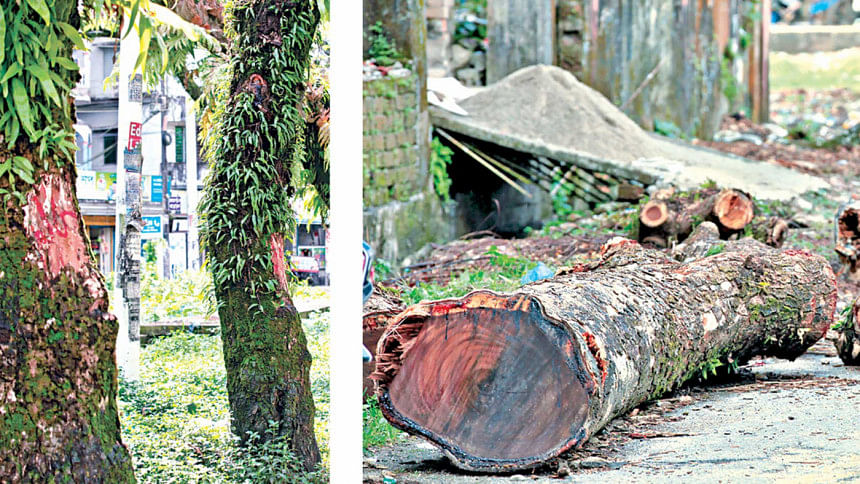Felling trees for development can’t be the norm

Worrying developments have been reported in the Shahjalal Upashahar area of Sylhet city where 200 trees were recently chopped down. A report by The Daily Star on Thursday carried a collage of two photos, one showing logs of freshly cut trees while the other showing trees marked for future felling. While the number reported may not seem alarming in itself, the real picture emerges when you consider how this has been part of an ongoing trend to fell trees indiscriminately—often without any clearance from the forest office, and mostly, if ever, without any consequences faced by those responsible. What's more worrying is that this crime is being committed at the behest of local city corporation authorities, in the name of—in case you still needed a clue—development work.
In fact, the Sylhet City Corporation (SCC) has plans to cut more trees to expand the town's streets and improve its drainage system, and has even asked for clearance from the Forest Department for that purpose. According to a report published by this daily in May, the SCC admitted that it had felled 332 trees in the last five years, although data showed that at least 873 trees were cut down. The tree felling spree has been spotted in various parts of the city. While the bigger goal remains urban development, there have been dubious motives too, as exemplified by a local councillor in Shahjalal Upashahar who sold the recently felled trees without holding an auction, which is also against the law.
The importance of a tree cover in our fast-urbanising landscape cannot be stressed enough. Trees are a vital part of our environment, and cutting them without a new tree cover established in the affected region or elsewhere has serious repercussions for all of us. But when state officials themselves fell trees, without clearance, or collude with local influential people to profit from cutting trees, it sends a wrong message to the public, and also shows the level of impunity enjoyed by the offenders. We have seen similar incidents of cutting trees for various construction purposes across the country.
This can't be the established practice going forward. One may recall that the High Court, not long ago, issued an injunction restraining the government from felling trees for implementing its development projects in forests and forestlands. This should be extended to trees on non-forest land, too. If, indeed, trees are to be cut down for some reason, it must be done with extreme caution, proper authorisation and sufficient preparations for replenishment. And state authorities, including the Forest Department and local administrations, must send the message that they are as compliant with the environmental laws as ordinary citizens are expected to be. Those who fail to do so must be held accountable.

 For all latest news, follow The Daily Star's Google News channel.
For all latest news, follow The Daily Star's Google News channel. 



Comments